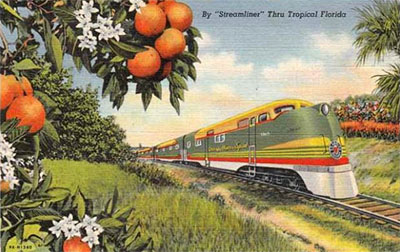19 Sept. 1917-3 July 1981

“Orange Blossom Special,” written in 1938 by Craven County native Ervin T. Rouse, has been called the “unofficial anthem of bluegrass.” Recorded first by Chubby Wise, it was brought to wide attention in 1942 by Bill Monroe and returned to the charts in 1965 by Johnny Cash. Born in 1917 east of Fort Barnwell, Rouse is said by some to have been the “greatest fiddle player to ever put rosin to a bow.” He left home at the age of eight to play in vaudeville shows in New York. For a time he and his brother followed an evangelist and used their musical skills to energize audiences. While on the road from a tender age, Rouse considered North Carolina home until 1938 when he bought a house in Miami.
It was in Florida that Rouse became acquainted with the Orange Blossom Special, a passenger train operated from New York to Miami by the Seaboard Air Line Railway from 1925 to the early 1960s. The song, with its vocals and interplay of fiddle and harmonica, evoked the train’s sound and speed. Biographer Randy Noles settled any questions about the song’s authorship which others had assigned jointly to Rouse and Wise. Rouse’s other compositions, among them “(I’ve got those) Craven County Blues,” did not reach as wide an audience.
Rouse married Hattie Whitehurst in 1941; they had three children. She left him in 1954 and moved back to North Carolina. Rouse visited his native state about twice a year in the 1950s and 1960s, often playing shows in New Bern, Kinston, and Cove City. When Johnny Cash revived the song, Rouse took the stage to share the acclaim in one show. Cash supported him directly and through royalties. In his last years (he died in 1981) Rouse was troubled by alcoholism and mental illness, fiddling for tips in isolated taverns on the edge of the Everglades. But the song endures and has been featured in the film “Urban Cowboy” and the TV series “Benny Hill.” In 2005 the Atlanta Journal-Constitution named “Orange Blossom Special” one of 100 “Songs of the South.”
- Listen to a recording of the "Orange Blossom Special," performed by the Rouse Brothers, ca. 1939.
- Listen to a recording of the "Orange Blossom Special," performed by the Steep Canyon Rangers at the Orange Peel, Asheville, North Carolina, December 8, 2006.